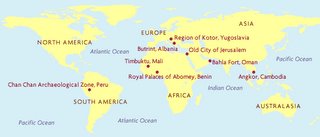The World Summit on the Information Society is finally over.
Another good thing is that it has engendered public discussion on information and communications technology for development. Unfortunately, most of that discussion seems to have centered on the role of ICANN in the governance of the Internet, and on “A Laptop for Every Child”. Unfortunately, the key issues that should have been and sometimes were discussed at the Summit have been largely overlooked by the media.
The industrial revolution, which still has not reached all of the world’s population, transformed society by substituting power from engines for animal power, and by mechanizing tasks that previously had been done by hand. It marked the emergence of manufacturing industries over extractive industries as the drivers of development. It profoundly changed the nature of society.
The information revolution, which is just beginning to affect most of the world, transforms society by enabling affordable communication at a distance, and by automating tasks previously done in the minds of men – calculation, storage and retrieval of information, etc. It marks the emergence of service industries over manufacturing industries as the drivers of development. It will profoundly change the nature of society.
The age of the printing press, beginning in the 1450’s, was advanced by the industrial revolution allowing printed material to be produced in greater and greater amounts, more and more cheaply, and distributed more widely and economically. The age of the microchip, beginning five centuries later, is extending all of these benefits. The growth of knowledge in the age of the printing press has been exponential, and it seems likely that the age of the microchip will allow that exponential growth to continue. Knowledge is now the driving force not only of the economies of rich countries, but increasingly of social and political development.
100 years from now, WSIS might be seen as a benchmark, as the first time the global community met to formally recognize the information revolution and information society. Of course, we barely recognize that we are at the beginning of such a transition, and we can not begin to predict its eventual ramifications. No wonder the participants at WSIS focused on small steps for men, rather than the giant step for mankind.
ICT and PovertyThe information society, as seen today by poor people in poor countries, is more a matter of radio and mobile phones than of computers and the Internet, although you would not appreciate the fact from the media coverage of WSIS. I do not belittle radio and telephones; they are a huge advance!
The unseen action of ICT on poverty is still more important. The extractive industries, agriculture, forestry, fishing, mining, become more efficient as ICT is applied. Indeed, extractive industries benefit that we hardly consider as such, such as the “water industry”. Manufacturing too is transformed, albeit not at the level of the micro-enterprise in poor countries, by the application of ICT, from the design of plant and equipment, to the management of the process, to the marketing of goods. Transportation too becomes more efficient, as ICT is applied to the design and manufacture of vehicles of all kinds, to their operation, and to their management. Services, including governance, financial, health and educational services are perhaps even more able to achieve efficiency and coverage gains than the extractive and manufacturing industries. The transformation of economies by ICT is not accomplished by giving every poor person a computer, but rather by appropriate investments in technology where they will have the highest benefit-to-cost ratio. In societies with pro-poor policies, the rising tide of economic growth does in fact raise all boats including those of the poor. And indeed, I suggest, proper applications of ICT for development make those pro-poor policies more likely and more effective.
A $100 laptopMIT’s media genius has grabbed the headlines, but in spite of the slogan “one laptop for every child”, MIT will be lucky to sell a million laptops in the next few years. MIT’s proposal is not only to revolutionize the market for educational computers in poor countries, but also to revolutionize educational software, and – perhaps more importantly – to revolutionize the pedagogy that surrounds the use of ICT in education and, still more generally, pedagogy itself. MIT will be lucky to produce any significant advances in e-learning in the next few years, much less to convince large numbers of teachers to utilize them.
But what happens if a million $100 laptops are put into place that would not otherwise be there? They would probably go to places with some economic possibilities, and would probably go to train kids who would eventually join an intellectual elite. They would probably go to places with educational administrators more adventurous than most, and indeed to classrooms with teachers more adventurous than most. The introduction of exciting new equipment and exciting new teaching methods and aids would be likely to improve the learning environment immeasurably. Getting a million kids into such an environment, and enabling them to join an intellectual elite in their nations after such an experience seems a great accomplishment to me.
John Daly






 Wrangel-St. Elias-Glacier Bay/Kluane-Tatshenshini-Alsek
Wrangel-St. Elias-Glacier Bay/Kluane-Tatshenshini-Alsek


 World Heritage Site #307
World Heritage Site #307




